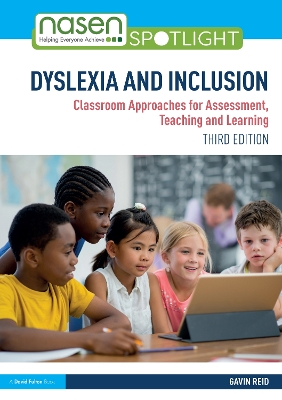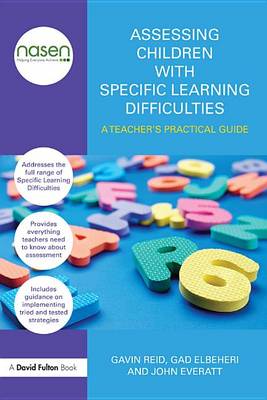nasen spotlight
2 total works
Now in a fully updated third edition, this book will equip all teachers with the necessary knowledge of dyslexia in order for it to be effectively understood and managed in the mainstream classroom. Offering comprehensive guidance and support strategies, this resource is based around Reid's signposts for successful inclusion:...
Read moreNow in a fully updated third edition, this book will equip all teachers with the necessary knowledge of dyslexia in order for it to be effectively understood and managed in the mainstream classroom. Offering comprehensive guidance and support strategies, this resource is based around Reid's signposts for successful inclusion: acknowledging differences; recognising strengths; understanding what is meant by inclusion; planning for practice; and ensuring attainable task outcomes. In identifying the key issues of inclusive practice, the book supports teachers as they strive to fulfil the social, educational and emotional needs of children with dyslexia.
Key features of the new edition include:
- Up-to-date references to current research and legislation
- New sections on evidence-based teaching strategies, developing independent learning and communication with parents
- Detailed information on wider reading and additional resources, including websites, apps and software available to support learners with dyslexia
With practical strategies and resources designed to meet the needs of the busy classroom teacher, this book is crucial reading for educators and education students looking to help students with dyslexia reach their full potential.
Assessing Children with Specific Learning Difficulties
by Gavin Reid, Gad Elbeheri, and John Everatt
This comprehensive book provides all the information that practitioners need to know about assessment in relation to their pupils with Specific Learning Difficulties. The why, how and what of assessment is addressed, whilst the link between assessment and intervention is also a key focus.
Looking at the full...
Read moreThis comprehensive book provides all the information that practitioners need to know about assessment in relation to their pupils with Specific Learning Difficulties. The why, how and what of assessment is addressed, whilst the link between assessment and intervention is also a key focus.
Looking at the full range of Specific Learning Difficulties, this book provides practical guidance on implementing strategies that are tried and tested for use in any classroom, whilst also acknowledging that assessment is a process involving other professionals and parents. Addressing issues and topics common in inclusive classrooms around the world, key topics covered include:
- Specific Learning Difficulties in context
- Teacher Assessment in literacy, numeracy and movement
- Motor development and co-ordination
- Attention factors in learning
- The key issues on learning differences
- Self-esteem and emotional literacy
- How to enhance skills and the self-sufficiency of teachers
Assessing Children with Specific Learning Difficulties will be an invaluable guide for classroom teachers, learning support departments, psychologists and other professionals.


